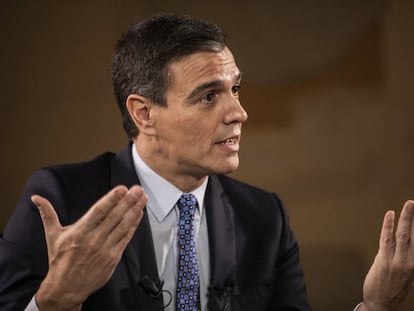Socialists win repeat Spanish election, Vox becomes third-biggest force in Congress
A poll that was meant to unblock the political situation in Spain has only served to complicate it, with losses for the left, a recovery for the PP and a huge boost for the far-right
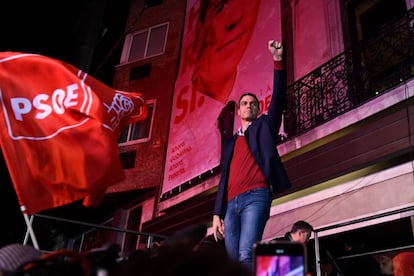
The Socialist Party (PSOE) of caretaker Prime Minister Pedro Sánchez won the highest number of seats but fell short of an absolute majority at the repeat general election in Spain on Sunday.
With around 99% of the vote counted, the PSOE had taken 120 seats – three fewer than the result it managed at the April 28 general election. The conservative Popular Party (PP) won 87 seats – a major gain from the 66 seats it secured in April, its worst result ever. But far-right group Vox saw the most significant rise, jumping from 24 to 52 seats, to become the third-largest party in Spain’s lower house, the Congress of Deputies.
Unidas Podemos – a coalition of the United Left and anti-austerity group Podemos – retained 35 of the 42 seats it won at the last election, while the center-right party Ciudadanos (Citizens) suffered a crushing defeat, losing more than 40 seats to be left with just 10.
For decades the PSOE and PP had taken turns in power, but the economic crisis spawned protest parties and Spanish politics have lately been defined by a lack of parliamentary majorities and the inability of politicians to reach governing deals. Sunday’s vote was the fourth general election Spain has held in as many years.
Generosity
The inconclusive results mean that Spain is facing more political uncertainty, as neither the left-wing or right-wing blocs have the 176 seats needed for an absolute majority in the 350-seat Congress. Ciudadanos’ collapse and the rise of the PP and Vox have consolidated right-wing positions in Congress, while the center has become practically irrelevant.

Sánchez has asked other parties for “generosity” to break the stalemate. “Our goal is to form a stable government. We have won the elections. This time, no matter what, we are going to achieve a progressive government,” he said on Sunday night. While Sánchez said he was reaching out to all political parties, he made a point of excluding “those that sow the rhetoric of hate,” in a thinly veiled reference to Vox.
After the results came in, Ciudadanos leader Albert Rivera announced he would call an emergency meeting of the party’s executive to discuss its future. “What we have had today is an unmitigated bad result, without excuses,” he said. On Monday morning, he announced his resignation as party chief.
The president of the PP, Pablo Casado, suggested on Sunday night that the caretaker PM should step down. “Sánchez has lost his referendum, he is the big loser today,” said Casado, who had earlier described this repeat election as a second round of the April 28 vote.
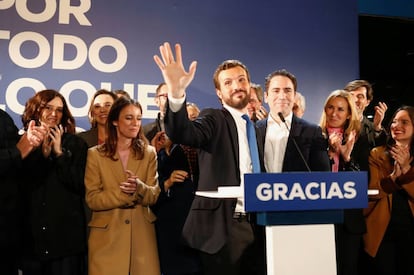
Meanwhile, Vox leader Santiago Abascal celebrated the far-right group’s result: “Eleven months ago we had no representation in any government institution,” he told cheering, Spanish-flag-waving crowds. “Today we are the third political force in Spain. [...] We have told the left that they have no moral superiority.”
Pablo Iglesias, the leader of Unidas Podemos, said the repeat election had only served to “strengthen the right and turn the far right into one of the strongest in Europe.” Iglesias called again for a coalition government between his party and the PSOE. “What in April was an opportunity – a progressive coalition government – is now a necessity,” he said, after the results were announced.
Rise of Vox
Just one year ago, Spain was the only large country in Europe without a xenophobic party sitting in parliament.
Support for the far-right group appears to have soared in response to the violent protests in Barcelona that erupted in October after the Spanish Supreme Court sentenced nine Catalan separatists to prison for their involvement in the 2017 breakaway bid. The ruling led to major disturbances, with hundreds of people injured and more than €2.7 million in damage caused to public property.
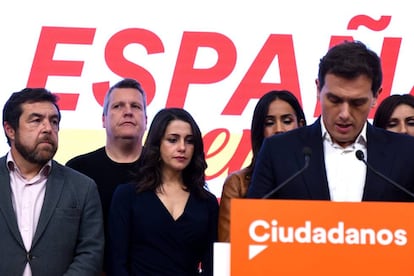
During a televised debate ahead of the election, Vox leader Abascal pledged to outlaw separatist parties – including the Basque Nationalist Party (PNV) – and send Catalan premier Quim Torra to prison.
Vox has also been a vocal critic of the recent exhumation of Spanish dictator Francisco Franco from the Valley of the Fallen. The party opposes the Historical Memory Law (which formally condemns the Franco regime), and has also campaigned against immigration and the gender violence law.
Campaign for the center
During the election campaign, Sánchez and PP leader Pablo Casado competed to win over centrist voters disillusioned with Ciudadanos.
Casado brought the PP back to the center after a shift to the right led the party to its worst-ever result in April.
Sánchez, meanwhile, toughened his tone on the separatist movement in Catalonia, promising to criminalize the organization of illegal independence referendums, such as the one that took place in the breakaway region in October, 2017. This crime was introduced into the Spanish penal code by a conservative government in the early 2000s in response to a referendum proposal by the Basque Country, but it was later repealed by a Socialist administration.
How Spain got here
Sánchez won the highest amount of votes at the April 28 general election, but fell short of an absolute majority, meaning he needed the support of other parties to be sworn in as prime minister. But despite months of negotiations, the Socialist Party and its most-likely partner Unidas Podemos were unable to reach a governing deal.
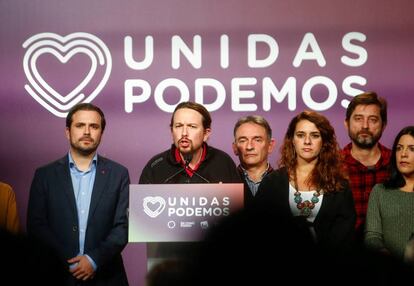
In July, Sánchez offered Unidas Podemos leader Pablo Iglesias three ministerial positions and a deputy PM spot, in exchange for supporting his investiture bid. But Iglesias rejected the offer, claiming they were “decorative” positions. After the failed investiture vote, the Socialist leader refused to negotiate a coalition with Unidas Podemos and pushed for a single-party executive.
Sánchez called on Ciudadanos and the PP to abstain from a second investiture vote to break the political deadlock, but both parties refused. Indeed, Ciudadanos’ months-long refusal to negotiate with Sánchez triggered resignations by four senior party officials who disagreed with party leader Albert Rivera’s shift to the right, and led to a major drop in voter support.
English version by Melissa Kitson.
Tu suscripción se está usando en otro dispositivo
¿Quieres añadir otro usuario a tu suscripción?
Si continúas leyendo en este dispositivo, no se podrá leer en el otro.
FlechaTu suscripción se está usando en otro dispositivo y solo puedes acceder a EL PAÍS desde un dispositivo a la vez.
Si quieres compartir tu cuenta, cambia tu suscripción a la modalidad Premium, así podrás añadir otro usuario. Cada uno accederá con su propia cuenta de email, lo que os permitirá personalizar vuestra experiencia en EL PAÍS.
En el caso de no saber quién está usando tu cuenta, te recomendamos cambiar tu contraseña aquí.
Si decides continuar compartiendo tu cuenta, este mensaje se mostrará en tu dispositivo y en el de la otra persona que está usando tu cuenta de forma indefinida, afectando a tu experiencia de lectura. Puedes consultar aquí los términos y condiciones de la suscripción digital.

